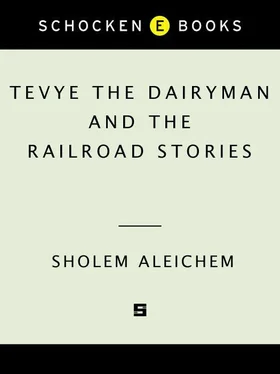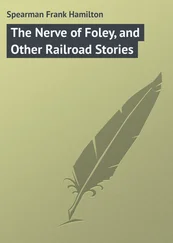“I already told you, Papa,” said my Beilke, interrupting me, “not to compare me to Hodl. Hodl lived in the Age of Hodl and Beilke lives in the Age of Beilke. The distance between the two is as great as from here to Japan.”
I ask you, is that Japanese or not?
Well, I see you’re getting off at the next station, Pani. Just give me two more minutes. I left my lucky youngest daughter’s house with a bellyful of her sorrows, a shattered, a devastated man; flung my cigar, which had only given me a headache, on the ground; and yelled at it, “You should go straight to hell, you and your father and all your uncles!”
“Whose uncles did you say, Reb Tevye?” I heard a voice ask behind me. I turned around — why, it’s Efrayim the Matchmaker, the Devil take him and keep him!
“Well, well, a fellow Jew!” I say. “What are you doing here?”
“What are you doing here?” he asks.
“Visiting my daughter,” I say.
“And how is she?” he asks.
“How should she be?” I say. “Not everyone has luck like hers.”
“I can see you’re happy with my merchandise,” he says.
“Happy,” I say, “is not the word. You should only be as happy yourself.”
“Thank you for your kind wishes,” he says. “Perhaps you’d like to add a small remittance to them.”
“Are you trying to tell me,” I say, “that you never were paid your matchmaker’s fee?”
“That Podhotzur of yours,” he says, “should only be worth as much as he paid me.”
“You mean he short-changed you?” I ask.
“Not at all,” he says. “What he gave me just wasn’t enough.”
“Why not?”
“Because there’s not a kopeck left of it.”
“How come?”
“I married off a daughter myself.”
“Mazel tov!” I say. “May God grant you pleasure from her.”
“A fine lot of pleasure He’s already granted me,” he says. “I wound up with a gangster for a son-in-law. He beat my daughter black and blue and ran away with all her money to America.”
“But why didn’t you stop him?” I say.
“Why, what could I have done?” he asks.
“Well,” I say, “you might have salted him away in a pickle barrel.”
“I see you’re in a gay mood today, Reb Tevye,” says Efrayim.
“It would be a fit punishment for God,” I say, “if He had to feel half as gay as I do.”
“Is that so?” he says. “And here I was thinking how lucky you were to be a rich Jew. Well then, how about a pinch of snuff to cheer you up?”
I took the snuff, said goodbye to the matchmaker, drove home to my village, and began to sell all the worldly goods I had accumulated over the years. Mind you, that’s easier said than done. Every pot and pan, the silliest little item, cost me a year of my life; if it didn’t remind me of my poor Golde, it reminded me of my daughters, may they live. The cruelest blow of all, though, was getting rid of my horse. I felt like a traitor to him. You see, we had suffered together for so many years, slaved together, been through so much together — and here I was, putting him on the block! In the end I sold him to a water carrier, because dealing with coachmen was too aggravating. You should have heard the guff I had to take from them. “God help us, Reb Tevye,” they said to me, “do you call that thing a horse?”
“And what does it look like to you,” I say, “a chandelier?”
“Not at all,” they say. “A chandelier doesn’t have four legs. In fact, for a horse we’d give him ninety-nine out of a hundred.”
“You would?” I say.
“Yes,” they say. “He’ll live to be a hundred and he’s already ninety-nine. His lips are gray, there’s not a tooth in his mouth, and his ribs shake like an old woman’s on a cold winter night.”
That’s coachmen’s talk, in case you didn’t know. I swear to you that my nag understood every word of it, just like it says in the Bible: veyoda shor koyneyhu —even a dumb beast knows when it’s been put up for sale. And the proof of it was that when I slapped the water carrier on the back to congratulate him, my horse turned his old head to me and gave me a silent stare that said, “Zeh khelki mikoyl amoli — is this how you thank me for all I’ve done for you?” I took one last look at his new owner leading him away and beginning none too gently to teach him his new trade, and I thought as I stood there all alone, God Almighty, how cleverly You run this world of Yours: here You create a horse and here You create a Tevye, and one fate is enough for them both! The only difference is that a man has a mouth and can grumble till he’s hoarse, while a horse can’t grumble till he’s man. That’s why he’s only a horse.
You see the tears in my eyes, Pan Sholem Aleichem, and you must be thinking, how Tevye misses his horse! But what makes you think it’s just my horse? I miss everything, there’s not one thing it doesn’t grieve me to think of. I miss my horse, I miss my village, I miss its elder, I miss its policeman, I miss the dachas of Boiberik, I miss the rich Jews of Yehupetz, I even miss Efrayim the Matchmaker, may the cholera carry him off! When you get right down to it, he’s nothing but a miserably poor Jew himself who’s out to make a living like the rest of us. Don’t ask me what I’ll do in the Land of Israel if I get there safely, God willing, but I do know one thing for sure, and that’s that right off I plan to visit Mother Rachel in her grave. I’ll pray there for the daughters I’ll probably never see again, and I’ll think of him, too — I mean Efrayim the Matchmaker — and of you, and of Jews everywhere. Here, let’s shake on that! Be well, and have a good trip, and give my very best to any of our friends you may happen to meet on your way.
(1909)
Greetings, Pan Sholem Aleichem, greetings to you and yours! I’ve been looking for you everywhere, because I have some fresh goods for you. Where have you been? Why haven’t I seen you? I’ve been told you were traveling all over the world, to all kinds of far places, each of the hundred-and-seven-and-twenty lands of King Ahasuerus … But am I imagining it, or are you really giving me a strange look? You seem to be trying to make up your mind if it’s me or not. It’s me, Pan Sholem Aleichem, it’s me — your old friend Tevye in person, Tevye the Dairyman! That is, I’m still Tevye, though I’m not a dairyman any more; I’m just a plain everyday Jew, and an old one too, as you can see, though to go by my age, no older than it says in the Haggadah: harey ani keven shivim shonoh —why, I’m not even pushing seventy yet … So why, you ask, all the white hair? Believe me, my dear friend, I didn’t grow it for fun. It’s partly from my own private sorrows — God forgive me for putting myself first! — and partly from those of Jews everywhere. What times we live in! What a miserable time to be a Jew!.. I can see, though, that you’re itching to ask me something. I suppose it’s because you remember having said goodbye to me as I was leaving for the Land of Israel. You must be thinking that I’m back from there, and you can’t wait to hear news of the Wailing Wall, Mother Rachel’s Tomb, and all those other places. Well, let me assure you that if you’ve got the time for me, I’ve got the news for you. In fact, if you listen to me carefully, with a real shmo’eyni , as Father Abraham says, you’ll soon say yourself that God’s in His heaven, man is a jackass, and all is right with the world.
In a word, what Bible reading are you up to in the synagogue this week, the first chapter of Leviticus? Well, I’m a bit behind, because I’m still back in the third chapter of Genesis. That’s the chapter of Lekh-Lekho, you know, where God shows Abraham the door. Lekh-lekho —get thee out, Tevye— meyartsekho —from your land— umimoyladitkho —and from the village you were born in and lived in your whole life— el ha’orets asher arekko —to wherever your legs will carry you … And when did it occur to the powers-that-be to tell me that? Not a minute before I’m so old, weak, and lonely that I’m a real al tashlikheynu le’eys ziknoh , as it says in the Rosh Hashanah prayer … Only I’m getting ahead of myself, because I was telling you about my trip and what’s new in the Land of Israel. Well, what should be new there, my dear friend? It’s a land flowing with milk and honey — if you don’t believe me, you can read up on it in the Bible. There’s only one thing the matter with it, which is that it’s there and I’m here … and not only am I still here in Russia, I’m still a schlimazel in Russia, and a schlimazel I’ll be till I die! Just think of it: there I was with one foot practically in the Holy Land already — I had only to buy a ticket, board a ship, and heigh-ho! — when what does the good Lord decide to do? It shouldn’t happen to you or to anyone, but one night my son-in-law, Motl Komzoyl, the tailor from Anatevka, gets it into his head to go to bed well and wake up dead in the morning. I don’t mean to say he was the picture of health before that. He was a workingman, after all, who spent day and night al hatoyroh ve’al ha’avoydoh , patching pants with his needle and thread. Well, the long and short of it was that he came down with the dry cough, and coughed and coughed until he coughed his lungs out. Nothing helped him one bit, not the doctors with their medicines, or the quacks with their snake oils, or the goat’s milk, or the chocolate with honey. He was a fine young man; a bit simple perhaps, without any learning, but also without any guile; and was he ever crazy about my Tsaytl! He lived his whole life for her and her children, and he would have done anything for me, too …
Читать дальше












